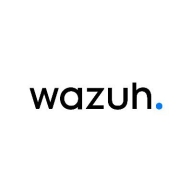

Sentinel and Wazuh compete in the security solutions market, specializing in threat detection and management. Sentinel holds an advantage with its advanced threat detection through smart analysis and automation, while Wazuh's strengths are in flexibility and cost-effectiveness from being open-source.
Features: Sentinel's key features include advanced threat detection with smart analysis, seamless integration with Microsoft tools, and robust automation capabilities. Wazuh offers flexibility and scalability due to its open-source nature, excellent compliance monitoring, particularly with PCI DSS and CIS benchmarks, and integration points with Kubernetes and cloud services like AWS.
Room for Improvement: Sentinel may need to improve its correlation engine and expand device support for smoother cloud integration. Wazuh could benefit from enhancing its threat intelligence capabilities, simplifying usage with more out-of-the-box features and templates, and refining its web interface for improved user experience.
Ease of Deployment and Customer Service: Sentinel adapts well to various deployment environments, offering strong customer support, although experiences may vary. Wazuh supports versatile deployment across cloud and on-premises setups but relies heavily on community-driven support, which can be a limitation for enterprise needs.
Pricing and ROI: Sentinel is a subscription-based service with premium security features justifying its cost, catering primarily to larger organizations. Wazuh, being free and open-source, attracts smaller organizations seeking low operational costs; however, users should consider potential additional costs for support and infrastructure.
I have seen value in security cost savings with Wazuh, as using proprietary EDR versions could save us substantial money.
They responded quickly, which was crucial as I was on a time constraint.
We use the open-source version of Wazuh, which does not provide paid support.
The documentation is good and provides clear instructions, though it's targeted at those with technical backgrounds.
It can accommodate thousands of endpoints on one instance, and multiple instances can run for different clients.
Currently, I don't see any limitations in terms of scalability as Wazuh can still connect many endpoints.
Scalability depends on the configuration and the infrastructure resources like compute and memory we allocate.
The indexer frequently times out, requiring system restarts.
The stability of Wazuh is largely dependent on maintenance.
The stability of Wazuh is strong, with no issues stemming from the solution itself.
Price is always a consideration, so the price would be nice if it were lower.
Machine learning is needed along with understanding user behavior and behavioral patterns.
I think Wazuh should improve by introducing AI functionalities, as it would be beneficial to see AI incorporated in the threat hunting and detection functionalities.
Wazuh could improve by creating videos on YouTube covering installation, use cases, and integration of third-party APIs for different scenarios that other SAAS services provide.
They nearly always bill it in dollars, so if it can be billed in our currency, that would be helpful and fixed in our currency.
Wazuh is completely free of charge.
I would definitely recommend Wazuh, especially considering Fortinet's licensing model which is confusing and overpriced in my opinion.
Wazuh is free to use, but there are licensing fees for third parties.
Sentinel's best features include that it's a very easy product to use.
The fact that it is open source means it is always being expanded, which is beneficial for customizing solutions for individual client requests.
With this open source tool, organizations can establish their own customized setup.
The system allows us to monitor endpoints effectively and collect security data that can be utilized across other platforms such as SOAR.
| Product | Market Share (%) |
|---|---|
| Wazuh | 10.2% |
| Sentinel | 3.9% |
| Other | 85.9% |


| Company Size | Count |
|---|---|
| Small Business | 9 |
| Midsize Enterprise | 3 |
| Large Enterprise | 7 |
| Company Size | Count |
|---|---|
| Small Business | 26 |
| Midsize Enterprise | 15 |
| Large Enterprise | 8 |
Sentinel is a full-featured Security Information and Event Management (SIEM) solution that simplifies the deployment, management and day-to-day use of SIEM, readily adapts to dynamic enterprise environments and delivers the true "actionable intelligence" security professionals need to quickly understand their threat posture and prioritize response.
Wazuh offers comprehensive security features like MITRE ATT&CK correlation, log monitoring, and cloud-native infrastructure. It ensures compliance and provides intrusion detection with high scalability and open-source flexibility, ideal for businesses seeking robust SIEM capabilities.
Wazuh stands out in security information and event management by providing efficient log aggregation, vulnerability scanning, and event correlation against MITRE ATT&CK. Its capability to integrate seamlessly with environments, manage compliance, and monitor files makes it suitable for cloud-native infrastructures and financial sectors. Despite its technical support needing enhancement and opportunities for improving AI integration and threat intelligence, its open-source nature and cost-effectiveness make it appealing. Users can leverage custom dashboards powered by Elasticsearch for precise data analysis, even though there is a desire for a more user-friendly interface and better enterprise solution integration. Deployment may be complex, but its features contribute significantly to fortified security postures.
What are the essential features of Wazuh?Industries like finance and cloud infrastructure heavily utilize Wazuh for its security strengths. By monitoring endpoints and ensuring compliance with frameworks, companies can improve security posture and swiftly detect anomalies. The platform's focus on event correlation and alerts for security incidents is particularly beneficial.
We monitor all Security Information and Event Management (SIEM) reviews to prevent fraudulent reviews and keep review quality high. We do not post reviews by company employees or direct competitors. We validate each review for authenticity via cross-reference with LinkedIn, and personal follow-up with the reviewer when necessary.